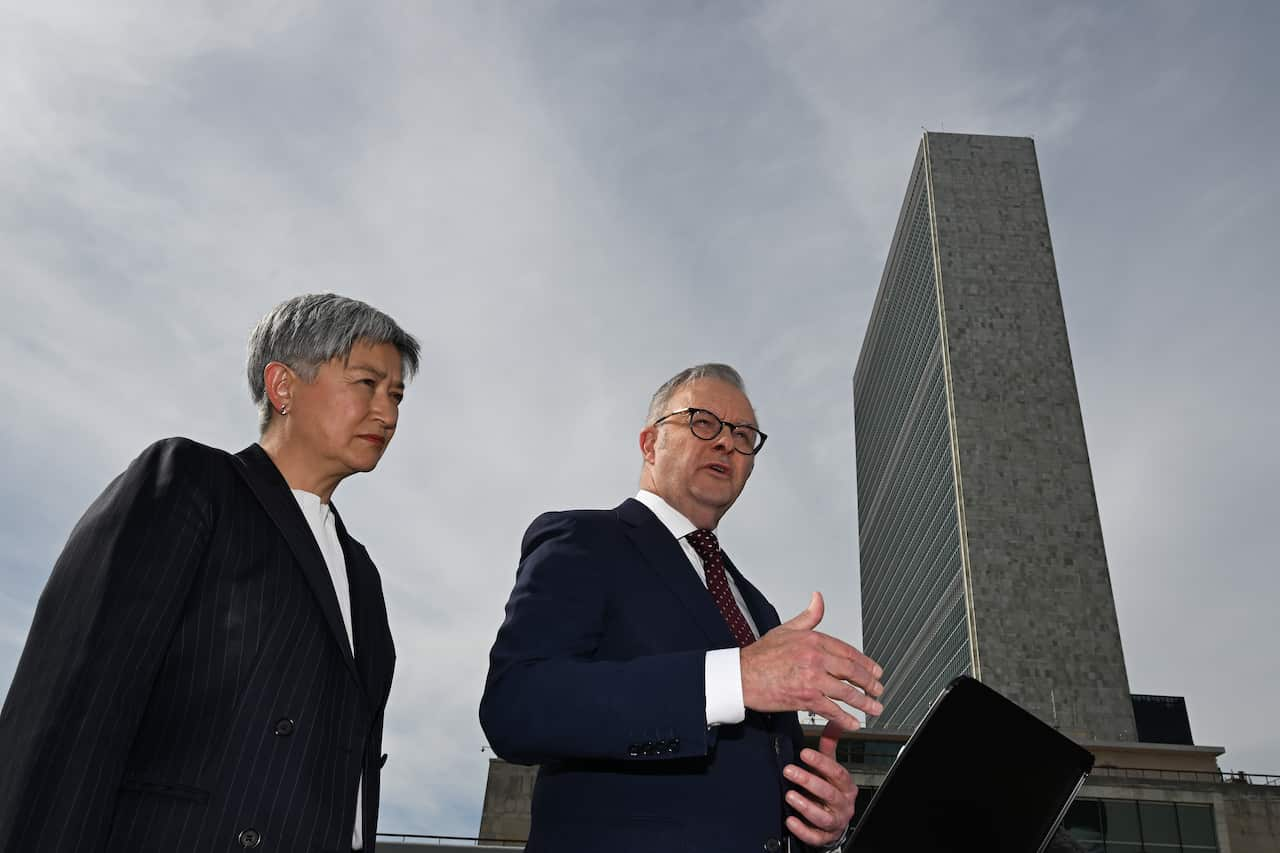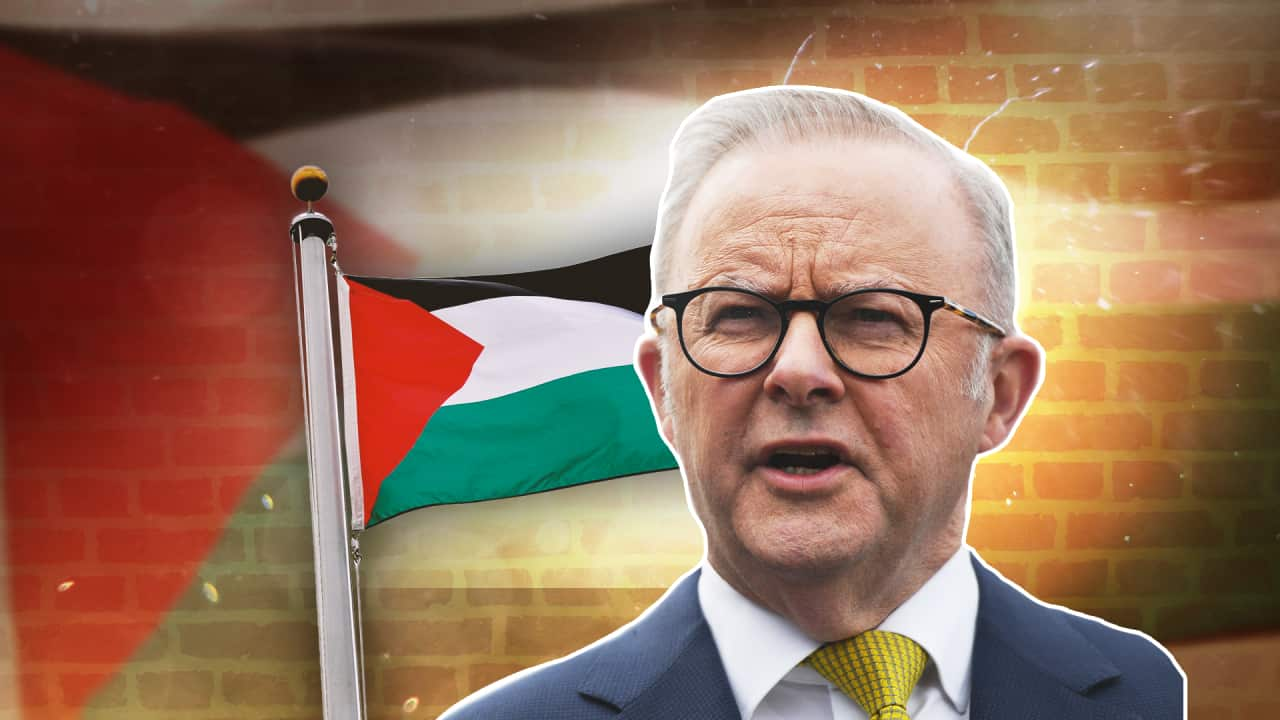Israel's Prime Minister Benjamin Netanyahu has issued a warning after Australia joined Canada and the United Kingdom in announcing it had formally recognised the "independent and sovereign state of Palestine".
Australia's declaration was made by Prime Minister Anthony Albanese and Foreign Minister Penny Wong outside the United Nations in New York City, where Albanese will deliver his first address to the General Assembly as part of the high-level leaders' week summit.
The formal statement was made in line with diplomatic allies Canada and the UK and comes into effect immediately. It is in line with a coordinated international push for a new path to a two-state solution as the devastating Hamas-Israel war in Gaza grinds on.
"Australia recognises the legitimate and long-held aspirations of the people of Palestine to a state of their own," Albanese and Wong said in a joint statement.
The government's position has attracted fervent criticism from the Australian Opposition, Israeli Prime Minister Benjamin Netanyahu and his government, and a group of Republicans in the United States who had made a last-ditch bid to pressure Australia not to proceed with a statehood declaration.
'There will be no Palestinian state'
Israeli Prime Minister Benjamin Netanyahu said the decision was "rewarding terrorism" and vowed to respond.
"We doubled Jewish settlement in Judea and Samaria — and we will continue on this path," he said, using the Biblical term for the West Bank.
"A Palestinian state will not be established west of the Jordan River. For years, I have prevented the establishment of this terrorist state despite tremendous pressure both domestically and internationally.
"The response to the latest attempt to impose a terrorist state in the heart of our land will be given after my return from the United States. Wait for it."
Israel's foreign ministry said political gestures "aimed at a domestic voting audience" would "harm" the Middle East.
"Israel will not accept any detached and imaginary text that attempts to force it to accept indefensible borders," spokesperson Oren Marmorstein said.
Asked about the Israeli response, Albanese said settlements were one of the reasons that led the world to act on recognition.
"We've seen an ongoing expansion of settlements in the West Bank. We have Israeli ministers who completely reject any idea of Palestinians having any future homeland. And we've seen as well as the humanitarian catastrophe that's unfolding in Gaza," he said.

"We go back to the resolution that was carried by the parliament with support from all of the government parties after October 7 that called for the protection of innocent life, that calls for the implementation, of course, and the compliance with international law," Albanese said.
"And we continue to be strong advocates. And what has happened is that the world is saying enough is enough. The cycle of violence must end."
The Palestinian ambassador to the UN, Riyad Mansour, said recognition had the potential to open a political horizon and advance a two-state solution.
"Give peace a chance. Stop this insanity. Stop this genocide, allow peace to prevail. Save the lives of Palestinians and Israelis," he said.
"Save the lives of the hostages and prisoners. Peace is much nicer than war. Killing is no good, and I believe the Israeli people will also rise to the occasion. Enough is enough. Two years of trying to exterminate the Palestinian people and you did not succeed," Mansour said.
'False hope' for Palestinians
The decision breaks with decades of bipartisanship between Australia's two major political parties.
Opposition leader Sussan Ley and the Opposition's foreign affairs spokesperson, Michaelia Cash, issued a joint statement warning the government was giving in to "extortion" by Hamas, and this was a "hollow gesture" that gave Palestinians "false hope".
The Opposition insists recognition must come at the end of a peace process, not during the conflict.
"Palestine has no established borders and no effective government," it said in a statement.
"The inconvenient truth for the Albanese government is this recognition comes while hostages remain in tunnels under Gaza and while the Gaza Strip and the Palestinian people remain under the control of the listed terrorist organisation Hamas."
At the same time, the government has expressed confidence in progress towards an internationally supported peace plan that would underpin rebuilding efforts in Gaza while ensuring Israel's security.
Further moves to establish an embassy presence and other diplomatic links will depend on whether the Palestinian Authority can meet a series of contentious requirements.
They include continued public acknowledgement of Israel's right to exist, democratic elections, and changes to financial operations, as well as the process of governing and within the education system.
"Terrorist organisation Hamas must have no role in Palestine," the government statement said.
"Further steps, including the establishment of diplomatic relations and opening of embassies, will be considered as the Palestinian Authority makes progress on its commitments to reform."
Recognition has already been signed off by the Australian cabinet and does not require ratification in parliament or a UN vote to take effect. It is now the official government policy.
It means Australia has joined over 147 of 193 UN member states that recognise a Palestinian state.
The move to recognise statehood is in line with France, as well as the UK and Canada, but it puts Australia at odds with its closest security ally, the US.
Albanese is yet to meet US President Donald Trump face-to-face, and while no meeting has been locked in, both leaders will be in New York for this week’s international talks.
Albanese foreshadowed recognition plans in August.
For the latest from SBS News, download our app and subscribe to our newsletter.

